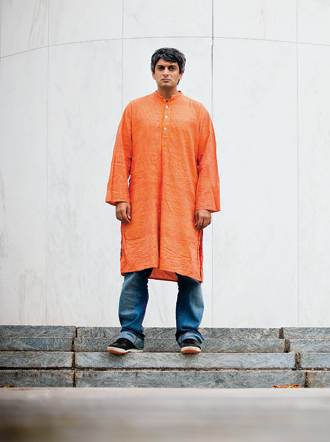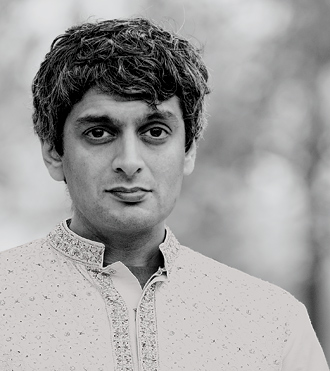Oberlin Alumni Magazine
Spring 2012 Vol. 107 No. 2
Poetry is Dangerous


Because of my recycling, the bomb squad came, the state police came. Because of my recycling, buildings were evacuated, classes were canceled, campus was closed. No. Not because of my recycling. Because of my dark body. No. Not because of my dark body. Because of his fear.
On April 19, 2007, after a day of teaching classes at the university in Pennsylvania where I worked, I went out to my car and grabbed a box of old poetry manuscripts from the front seat of my little white Volkswagen Beetle and carried it across the street and put it next to the trash can outside a school building near the center of campus. The poems were from poetry contests I had been judging, and the box was heavy. I had previously left my recycling boxes there, and they were always picked up and taken away by the trash department.
A young man from ROTC, which is housed in the building where I left the box, was watching me as I got into my car and drove away. I thought he was looking at my car, which has black flower decals along its sides and sometimes inspires strange looks. I later discovered that I, in my dark skin, am sometimes not even a person to the people who look at me. Instead, in spite of my peacefulness, my committed opposition to all aggression and war, I am a threat by my very existence, a threat just living in the world as a Muslim body.
Upon my departure, he alerted the police. He told them a man of Middle Eastern descent driving a heavily decaled white Beetle with out-of-state plates and no campus-parking sticker had just placed a box next to the trash can. My car had New York plates, but he got the rest of it wrong. I had two stickers on my car. One was my highly visible faculty parking sticker, and the other, which I just didn’t have the heart to take off, said "Kerry/Edwards: For a Stronger America."
Because of my recycling, the bomb squad came, the state police came. Because of my recycling, buildings were evacuated, classes were canceled, campus was closed. No. Not because of my recycling. Because of my dark body. No. Not because of my dark body. Because of his fear. Because of the way he saw me. Because of the culture of fear, mistrust, hatred, and suspicion that is carefully cultivated in the media, by the government, by people who claim to want to keep us "safe."
These are the days of orange alert, school lockdowns, and endless war. We are preparing for it, training for it, looking for it, and so of course, in the most innocuous of places — a professor wanting to hurry home, hefting his box of discarded poetry — we find it.
That man in the parking lot didn’t even see me. He saw my darkness. He saw my Middle Eastern descent. Ironic because though my ancestry is indeed Middle Eastern, I am Indian and look it; I’ve never been mistaken for a Middle Eastern man by anyone who’d ever met one.
One of my colleagues was in the gathering crowd, trying to figure out what had happened. She heard my description — a Middle Eastern man driving a white Beetle with out-of-state plates — and knew immediately they were talking about me and realized that the box must have been manuscripts I was discarding. She approached them and told them I was a professor on the faculty there. Immediately the campus police officer said, "What country is he from?"
"What country is he from?!" she yelled, indignant.
"Ma'am, you are associated with the suspect. You need to step away and lower your voice," he told her.
Today we give in willingly and wholeheartedly to a culture of fear and blaming and profiling. It is deemed perfectly appropriate behavior to spy on one another and police one another and report on one another. Such behaviors exist most strongly in closed and undemocratic and fascist societies.
At some length several of my faculty colleagues were able to get through to the police and get me on a cell phone. I explained to the university president, who was on the scene, and then to the state police, that the box contained old poetry manuscripts that needed to be recycled. The police officer told me that in the current climate I needed to be more careful about how I behaved. "When I recycle?" I asked.
The university president appreciated my distress about the situation but denied that the call had anything to do with my race or ethnic background. The spokesperson for the university called it an "honest mistake," referring not to the young man from ROTC giving in to his worst instincts and calling the police, but to me, who made the mistake of being dark-skinned and putting my recycling next to the trash can.
The university’s bizarrely minimal statement let everyone know that the "suspicious package" beside the trash can ended up being, indeed, trash. It goes on to say, "We appreciate your cooperation during the incident and remind everyone that safety is a joint effort by all members of the campus community."
What does that community mean to me, a person who had to walk by the ROTC offices every day on my way to my own office just down the hall—who was watched, noted and reported, all in a day’s work? Today we give in willingly and wholeheartedly to a culture of fear and blaming and profiling. It is deemed perfectly appropriate behavior to spy on one another and police one another and report on one another. Such behaviors exist most strongly in closed and undemocratic and fascist societies.
The university report does not mention the root cause of the alarm. That package became "suspicious" because of who was holding it, who put it down, who drove away. Me.
It was poetry, I kept insisting to the state policeman who was questioning me on the phone. It was poetry I was putting out to be recycled.
My body exists politically in a way I cannot prevent. For a moment that day, without even knowing it, driving away from campus in my little Beetle, exhausted after a day of teaching, listening to Justin Timberlake on the radio, I ceased to be a person when a man I had never met looked straight through me and saw the violence in his own heart.
Originally published in Orange Alert: Essays on Poetry, Art and the Architecture of Silence, University of Michigan Press, (c) 2010 by Kazim Ali.
Associate professor of creative writing and comparative literature Kazim Ali is the author of books of poetry, two novels, essay collections, and translations.

Want to Respond?
Send us a letter-to-the-editor or leave a comment below. The comments section is to encourage lively discourse. Feel free to be spirited, but don't be abusive. The Oberlin Alumni Magazine reserves the right to delete posts it deems inappropriate.